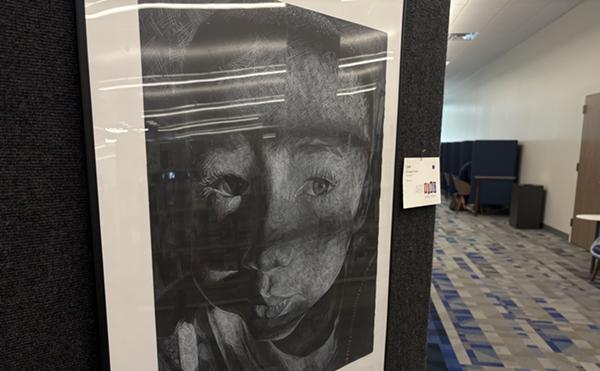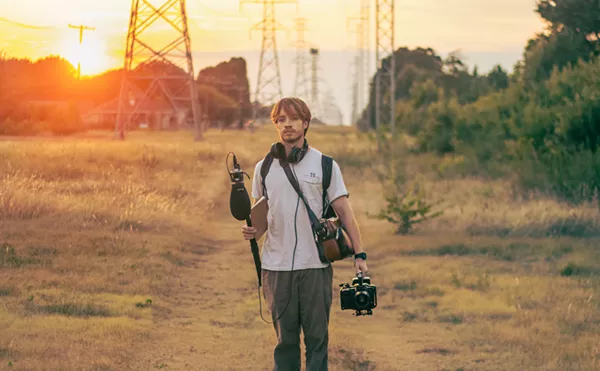As I watched the Sunday matinee of Brown Trouser Entertainment's production of David Goodwin's Exposure, Theatre Three's current run of Lee Blessing's Nice People Dancing to Good Country Music continued upstairs. Writer-director Goodwin, a Dallas native who's enrolled in New York University's Dramatic Writing Program, thanks T3's Thurman Moss in his play's program for the use of the subterranean performance room. The space is wide but low-ceilinged, and doubled nicely as a commercial photographer's studio, the setting of Exposure.
Nice People Dancing to Good Country Music got going a half hour later than Goodwin's small but ambitious play, and by the second act of Exposure, had apparently hit its stride with a footstomping musical number. As a result, there was an unfair level of distraction as Goodwin's nihilistic comedy was struggling to return from the long-distance swim its themes had taken. Raucous honky-tonk blasting from upstairs might be an acceptable accidental mix with a variety of sympathetic shows, but this play's urban, urbane perspective definitely wasn't one of them.
But Exposure would've drowned before it touched shore even without musical interruption from Theatre Three. The playwright seems to be struggling with precisely how to focus his gifts, to find tangible analogues for the Platonian "immutable forms" of his lofty but pointed criticisms on a Western civilization where mass advertising has rendered other forms of human communication obsolete.
But the sheer epicness of Goodwin's surrealistic snapshot of an apocalyptic struggle for the ownership of reality itself; the undeniable beauty of his language, much of which stayed afloat even though characters addressed each other with no clear motivation for speech; and a couple strong performances made the dip a bracing one. It's simultaneously thrilling and frustrating to watch a writer with such important things to say--and the ability to express himself with truly deft turns of phrase--hit only a few of his targets. A steady diet of flirtation without consummation is bound to make anyone wary of approaching the work of a green playwright; Joseph Fisher's Tundra, performed by Youth Could Know, was a similarly bipolar experience. Still, David Goodwin delivers some scintillating verbal foreplay before falling asleep on you, drunk from his own grandiose notions.
Exposure takes place during a particularly tumultuous 24-hour period in a commercial photography studio. The photographer, Rick (Mark Stoddard), is a moody, Prozac-popping S.O.B. who treats his assistants--the dim Sal (Jason Reynolds) and the tightly controlled Peter (Jason Schuler, a charming smartass)--like dirt. The first scene finds them attempting to shoot a lipstick ad with a hand model named Lisa (Tiffany Smetak) whose preoccupation with her meal ticket--her graceful white paws--supersedes everything else.
The conflict begins between Rick and Sal. The latter has trouble with Rick's proselytizing about his godlike mission on Earth--the manufacture of dreams for people who've surrendered their desire to dream to the mass media. It's a sacred responsibility that leaves Sal feeling soiled. When the arrival of a gun-wielding thug with government contacts named Haggar (Jeremy Schwartz, in a small but attention-getting role) confirms that the photography studio has a contract to help disseminate political propaganda about an unnamed enemy, Peter and Sal spiral into despair. In the process, Peter snaps and becomes a parody of his own supreme control--a statue whose noble profile is to be exploited in an advertising campaign for bravery during wartime.
On the extremely disjointed frame of its plot, Exposure drapes a series of epiphanies, elegies, laments, and non sequitur musings about the central role of the reproduced image in humankind's late-twentieth-century imagination. The observations are sometimes dazzling. "If you're going to work here, you'll have to make hyperbole a seventh sense," Peter tells Sal about their boss' extreme attachment to commercial photography as a messianic medium. And yet, exotic though his tirades may be, Rick has a better bead on his important role in the power scheme. Sal's innate simplicity and Peter's self-discipline will cost them dearly in the end.
The major flaw with Exposure is a fundamental one--David Goodwin needs to develop a sense of craftsmanship, of structural foundation, to match his thematic and stylistic rigorousness. The show's first act, however problematic, does build a high-wire sense of dread that the second simply cannot fulfill. The image of Jason Schuler as a pseudo-Greek statue, pistol pressed to his pale marble chest, is comical and eerie all at once. Weird is the rather loose adjective some kids apply to that collusion of the dreamy and the perverse, the point where some paranormal happenstance bridges the gap between alluring and threatening.
The best moments in Exposure crackle with this language of the subconscious, where our understanding of the world is at once affirmed and overthrown. But loaded as Schuler's character is with a prophetic doom that invokes hell as a perpetually unflattering pose, where photographing from a bad angle is pro forma, his participation in the anti-climactic final scenes are a little too statue-like. He has returned from unconsciousness with a sense of visual image as a prison, and has allowed himself to be co-opted as a kind of post-Cold War Mars, an idealized figure of masculine courage to boost a jingoistic cause. I yearned to hear more tales from his sojourn, to get a better sense of why the healthiest character in the play made a 90-degree turn into lunatic pawn.
The answers never come in Exposure, which isn't necessarily a problem--some of our best playwrights have turned the simple act of asking the question into heroic art. Impressively, David Goodwin seems to understand there is power and beauty in yearning. His own profound desire to wrest simple human experience from the throes of commercialism is laudable. But it eventually slips away from him and the audience, pulsing past us like the hypnotic but ephemeral light waves of the camera's flash.
Exposure runs through August 2. Call 871-3300.












